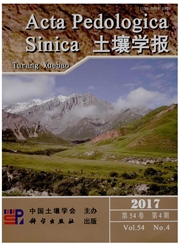

 中文摘要:
中文摘要:
团聚体稳定性是土壤中一个重要的物理性质。土壤有机大分子可提高团聚体的稳定性,而土壤电场则降低其稳定性。因此,本文研究了土壤电场与有机大分子(聚丙烯酰胺和腐殖质)的耦合作用对团聚体稳定性的影响,采用不同浓度的KNO,和Ca(NO3)2调节土壤电场,通过不同含量腐殖质和聚丙烯酰胺(PAM)来调节土粒间分子引力,以团聚体破坏后释放的〈10μm、〈5μm和〈2μm微团聚体和单粒的数量来表征团聚体的水稳定性。结果表明:(1)土壤电场在团聚体破坏中起关键作用,在高的电场条件下不论有无有机大分子,团聚体均可以发生猛烈的破裂;(2)在相同土壤电场条件下,向土壤中加入有机大分子,团聚体遇水破裂强度显著降低,且降低程度最高可达到60%以上;(3)电场与腐殖质以及电场与PAM的耦合程度不同,团聚体的破坏强度存在差异;(4)电场可使团聚体发生爆裂式破碎,随着加入有机大分子量的增加,团聚体发生爆裂式破碎的临界电位相应地减小。
 英文摘要:
英文摘要:
Aggregate stability is an important physical property of soils. As is known, organic macromolecules enhance stability of aggregates, while soil electric field acts reversely. Therefore, effect of coupling of electric field and organic macromolecules on soil aggregate stability, yet still unknown, is worthy of exploring. KNO3 and Ca( NO3 )2 solutions, different in concentration were used to adjust strength of soil electric field and humus and PAM added to control molecular attraction forces between soil particles in this experiment. Aggregate stability is characterized by content of the particles ( 〈 10 jxm, 〈5 p~m and 〈2 ~m in particle size) released from aggregates after their breakdown. Results show that soil electric field plays a crucial role in breaking aggregates. When the electric field is strong enough, soil aggregates are likely to break up violently, no matter whether there exist organic macromolecules or not. Soil aggregates are ready to break down when they get wet. Addition of organic macromolecules significantly reduces the degree of aggregate breakdown by as much as 60% under the same electric field. Because of varying extent of the coupling between electric field and hu- mus/PAM, clear discrepancies exist in extent of the breakdown. Strong electric field may lead to violent breakdown or explosion of aggregates. With increasing addition rate of organic macromolecules, the threshold potential triggering the explosion of aggregates declined correspondingly.
 同期刊论文项目
同期刊论文项目
 同项目期刊论文
同项目期刊论文
 Strong non-classical induction forces in ion-surface interactions: General orgin of Hofmeister effec
Strong non-classical induction forces in ion-surface interactions: General orgin of Hofmeister effec 期刊信息
期刊信息
